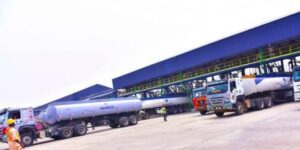Fuel prices making fight against severe hunger tough in Nigeria — UN
The removal of fuel subsidies and rising energy prices are exacerbating severe hunger in Nigeria, particularly in Northern Nigeria, according to the United Nations.
Approximately 4.3 million people in Nigeria’s Borno, Adamawa, and Yobe States are at risk of severe hunger, with the number of children under five at risk of life-threatening malnutrition doubling in one year to reach 700,000.
The situation is attributed to insecurity caused by non-State armed groups, preventing farming and income generation, as well as extreme weather impacts. Soaring prices of food, fuel, and fertilizers have further worsened the crisis while funding for the humanitarian response remains inadequate.
According to the United Nations, rising energy prices caused by the removal of fuel subsidies have intensified the battle against severe hunger in Nigeria, particularly in Northern Nigeria.
This was disclosed by the UN’s top humanitarian official in Nigeria, Mr Matthias Schmale, in Geneva on Wednesday.
He revealed that 4.3 million people in Nigeria’s Borno, Adamawa, and Yobe States are at risk of severe hunger, as the number of children under five at risk of life malnutrition had doubled in one year to reach 700,000.
Mr Matthias Schmale told reporters that severe hunger is affecting 4.3 million people in Nigeria’s Borno, Adamawa and Yobe States, adding that he has seen mothers fighting for the lives of their malnourished children in nutrition stabilisation centres.
He also revealed that the number of children under five at risk of life-threatening severe acute malnutrition had doubled in one year to reach 700,000.
He said, “I have been to Borno and the other two states several times. I’ve seen mothers fighting for the lives of their malnourished children in nutrition stabilisation centres.
“Those of us who are parents must imagine what it’s like when you cannot ensure your children have enough to eat,” he said.
He warned that the catastrophic situation is primarily the result of more than a decade of insecurity linked to non-State armed groups, which prevents people from farming and earning income from the land, citing other side effects including extreme weather impacts including flooding in Nigeria which affected more than 4.4 million people across the country.
The report also noted that the soaring prices of food, fuel and fertilisers have exacerbated the crisis, and the response remains severely underfunded, urging that of the $1.3 billion in humanitarian funding needed for the region, only 25 per cent has been secured so far.
This month, the United Nations World Food Programme (WFP) launched a $2.5 billion Country Strategic Plan (CSP) for Nigeria, aiming to combat rising hunger in the country.
The plan focuses on addressing hunger and malnutrition in selected states, particularly in the Northeast and Northwest regions.
The five-year plan (2023-2027) aligns with the Sustainable Development Goals (SDG 2) and seeks to achieve food security and improved nutrition in Nigeria by 2030. It also emphasizes the importance of health and well-being, education, gender equality, and climate action.



